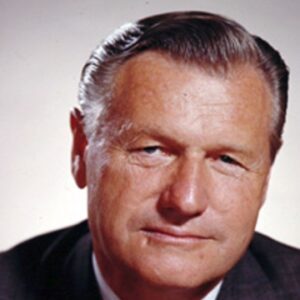Nelson Rockefeller was an American businessman and politician who served in Gerald Ford’s administration as the 41st Vice President of the United States from 1974 to 1977. Nelson was an heir to Standard Oil Co. Inc., the world’s largest oil refiner at the time, and was born into the famed American Rockefeller family. Despite his family’s wealth, Nelson’s father strove to instill in his son the ideals of modesty and moderation. After graduating from the Lincoln School, Nelson attended Dartmouth College, where he studied economics and worked part-time to supplement his income. Nelson worked in a number of family enterprises after graduating from college. He also entered politics and served on the Westchester County Board of Health at the same time. Nelson moved in and out of government in later years, serving as a secretary in both Harry Truman’s and Dwight Eisenhower’s administrations. Then he ran for governor of New York and was elected to the position four times in a row, serving from 1959 to 1973. In the interim, he tried unsuccessfully for the presidency on multiple occasions. Nelson was not just a great politician, but also a generous philanthropist and a vocal supporter of the civil rights struggle. He formed his own non-profit organization to help develop and also pushed for civil rights utilizing his position as a result of his desire to serve his country. Later in Gerald Ford’s Republican administration, he served as the 41st Vice President of the United States before retiring to private life.
Childhood and Adolescence
John B. Rockefeller Jr. and his first wife, Abby Greene Aldrich, gave birth to Nelson Aldrich Rockefeller on July 8, 1908, in Bar Harbor, Maine, United States. He was the third of six children born into one of the country’s wealthiest families and was the grandson of John D. Rockefeller Sr., the founder of the Standard Oil Company.
Nelson graduated from the Lincoln School in 1926 and went on to Dartmouth College, where he obtained a Bachelor of Arts degree in economics in 1930.
Following that, he worked at Chase National Bank’s London and Paris branches, and eventually managed the development of Rockefeller Center in New York, a project started by his father in the late 1920s.
The Career of Rockefeller
Rockefeller took an interest in government operations and drifted toward politics during his tenure in New York. He was appointed to the Westchester County Board of Health in 1933.
He entered national politics in 1940, accepting his first major governmental job as the Coordinator of Inter-American Affairs in President Franklin D. Roosevelt’s administration.
Despite being a Republican during Roosevelt’s Democratic administration, Nelson ascended through the ranks of the cabinet, eventually becoming the 1st Assistant Secretary of State for American Republic Affairs in 1944.
He resigned from his position in 1945 and went on to form a private nonprofit organization to help Latin American emerging countries. He returned to public service five years later, in 1950, when he was named head of the International Development Advisory Board in President Harry S. Truman’s administration.
Nelson was appointed 1st Undersecretary of the newly founded Department of Health, Education, and Welfare by President Dwight D. Eisenhower in 1953, a position he held until 1955.
Nelson ran for governor of New York State in 1958 and won, becoming the state’s 49th governor. He received high accolades for his efforts throughout his term and was re-elected to the position four times in a row, serving until 1973.
Nelson ran for the Republican presidential nomination three times during this time, in 1960, 1964, and 1968, but was unsuccessful each time. Nelson resigned from his position as Governor of New York in 1973, despite being re-elected.
Following Nixon’s resignation over the Watergate crisis, Nelson was nominated for the United States vice presidency by President Gerald Ford. Nelson Rockefeller was the 41st Vice President of the United States from December 1974 until January 1977.
After his stint as vice president ended, Rockefeller retired from politics and began a career in the arts. He amassed a large collection of modern paintings, sculptures, and primitive art as a result.
Nelson was also a published author, with works including ‘The Future of Federalism’ (1962), ‘Unity, Freedom, and Peace’ (1968), and ‘Our Environment Can Be Saved (1969). (1970).
Rockefeller’s Major Projects
Nelson oversaw significant improvements in New York’s budgetary, cultural, and educational policies and facilities during his four tenure as Governor of New York. He concentrated on education, housing, welfare, health care, transportation, the arts, and state construction projects as a liberal Republican.
Nelson was a well-known philanthropist and a strong supporter of the civil rights movement, and he was praised by Martin Luther King. He helped to fund the rebuilding of several bombed churches in the South and worked to raise the standard of living in disadvantaged areas of the world.
Achievements & Awards
Nelson Rockefeller was an avid art collector and investor, and his name is commemorated in a wing of the Metropolitan Museum of Art in New York.
Personal History and Legacy
Nelson married Mary Todhunter Clark, a Philadelphia socialite, shortly after graduating in 1930. They were married for five years and had five children before divorcing in 1962.
He married Margaretta Large Fitler in 1963, and the pair had two boys together. They were wedded till he passed away.
Nelson Rockefeller died of a heart attack in New York City on January 26, 1979. His ashes were deposited in a private Rockefeller family cemetery in Sleepy Hollow, New York after he was cremated in Ferncliff Cemetery near Hartsdale.
Estimated net worth
Nelson Rockefeller was an American businessman and politician who, at the time of his death, had a net worth of $1.1 billion. Nelson Rockefeller was born in July 1908 in Bar Harbor, Maine, and died in January 1979. He was a Dartmouth College graduate and a Republican.


